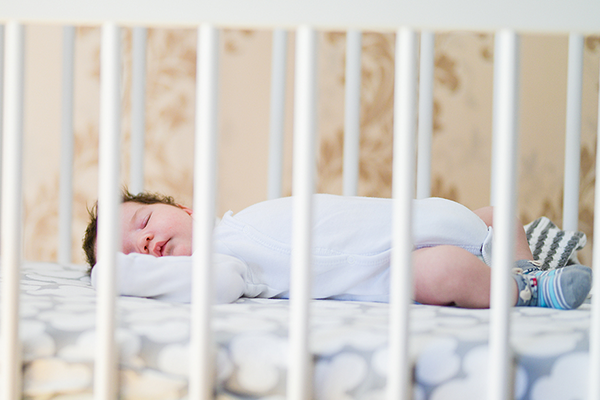As a parent, safe sleep for babies is a full-time job. In one 24-hour day, your baby may sleep as many as 19 hours with daytime nap — typically three to four hours at a time — and overnight.
During those times, it’s important that you ensure your baby sleeps safely. This protects your baby from choking or suffocation, as well as sudden infant death syndrome (SIDS).
Are you a parent or caretaker who wants to learn more about safe sleep for infants? Register for Cribs for Kids, a safe sleep education program presented by Safe Kids Greater Augusta.
Here are some common questions parents ask about safe sleep for babies.
Is It OK to Let My Baby Sleep in Bed With Me?
No, parents should not share beds with their babies. The most common cause of death in infants younger than 3 months is bed-sharing with parents.
To keep your baby safe throughout the night, remember the ABCs of safe sleep: Babies should sleep alone, on their backs and in a crib.
Just because your baby can’t sleep in your bed doesn’t mean you have to be far from him. Room-sharing is recommended by the American Academy of Pediatrics for the first year of your baby’s life, as it can reduce the risk of SIDS by as much as 50%. Room-sharing will also help you tend to your baby’s needs as he wakes up during the night.
What’s the Best Sleeping Setup for a Newborn?
Whether it’s naptime or bedtime, your baby should always sleep on her back, never her stomach or side. The rate of SIDS has gone down dramatically since this recommendation was made in 1992. Also, don’t use sleep positioners for your baby because they can increase the risk of suffocation.
When Can Babies Sleep with Pillows and Blankets?
After your child’s first birthday, it is safe for him to sleep with a light blanket, but keep any large pillows or stuffed toys outside the crib. Until then, your baby should sleep with only a fitted sheet on his crib. If you’re worried about your baby getting cold, dress him in a wearable blanket or other infant sleepwear.




